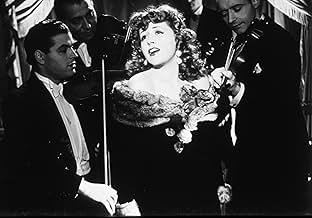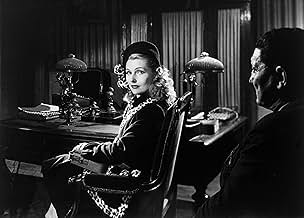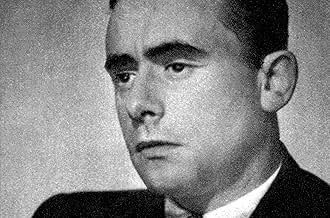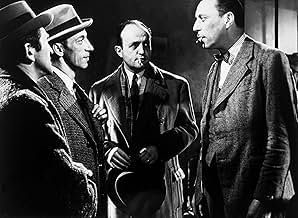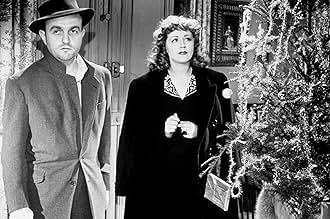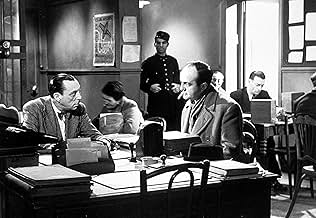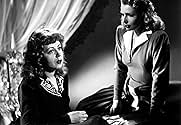CALIFICACIÓN DE IMDb
7.7/10
6.7 k
TU CALIFICACIÓN
Agrega una trama en tu idiomaA jealous husband intends to kill the man his wife is meeting for business, but arrives to find the deed already done.A jealous husband intends to kill the man his wife is meeting for business, but arrives to find the deed already done.A jealous husband intends to kill the man his wife is meeting for business, but arrives to find the deed already done.
- Dirección
- Guionistas
- Elenco
- Premios
- 2 premios ganados y 1 nominación en total
Henri Arius
- Léopardi
- (as Arius)
Charles Blavette
- Le gendarme Poitevin
- (as Blavette)
René Blancard
- Le commissaire principal de la P.J.
- (as R. Blancard)
Robert Dalban
- Paulo
- (as R. Dalban)
Jean Daurand
- L'inspecteur Picard
- (as J. Daurand)
Jean Dunot
- Nitram
- (as J. Dunot)
Jacques Grétillat
- Auguste
- (as J. Grétillat)
Gilberte Géniat
- Mme Beauvoir
- (as G. Géniat)
Gabriel Gobin
- Le patron du bistrot
- (as G. Gobin)
François Joux
- L' officier de police Fayard
- (as F. Joux)
Opiniones destacadas
A nice, humorous mix of music hall (in the first third mostly) and police procedural mystery as the various suspects' stories start to collapse. The final exposure of the murder may come as a surprise if you don't watch closely. A gritty look at Paris of the time. You can ignore the final scene (the Hollywood ending). Louis Jouvet is best as the police inspector who seems to be just passing through, but is really on top of things.
Henri-Georges Clouzot's "Quai des Orfevres" (1947) stars Suzy Delair, Bernard Blier, Louis Jouvet, and Charles Dullin. The story takes place in post-war Paris, where an accompanist, Maurice Martineau (Blier) lives with his singer wife, Marguerite, better known as Jenny Lamour (Suzy Delair). An important man, Georges Brignon (Dullin) promises Jenny work, and because she's ambitious, she flirts with him. Maurice is an extremely jealous man, so he finds Brignon in a restaurant and threatens him.
Later on, Jenny tells Maurice she is visiting her grandmother, who lives in another town. This gives Maurice a good opportunity to bump off Brignon, especially when he finds the man's address on a piece of paper in the kitchen and realizes Jenny was lying. But when he gets to Brignon's house, Brignon is already dead.
Inspector Antoine (Juvet) is assigned to the case, and it doesn't take him long to realize that some alibis aren't very secure.
Wonderful film, with the excellent Juvet outstanding as Inspector Antoine, and an excellent performance by Simone Renant as a lesbian photographer, Dora, in love with Jenny. Delair, who was involved with Clouzot, is good as a lower-class woman who loves her husband but wants to get ahead in show business as well.
This is Clouzot at his best, with a witty script with some plot twists and a true Parisian atmosphere.
Later on, Jenny tells Maurice she is visiting her grandmother, who lives in another town. This gives Maurice a good opportunity to bump off Brignon, especially when he finds the man's address on a piece of paper in the kitchen and realizes Jenny was lying. But when he gets to Brignon's house, Brignon is already dead.
Inspector Antoine (Juvet) is assigned to the case, and it doesn't take him long to realize that some alibis aren't very secure.
Wonderful film, with the excellent Juvet outstanding as Inspector Antoine, and an excellent performance by Simone Renant as a lesbian photographer, Dora, in love with Jenny. Delair, who was involved with Clouzot, is good as a lower-class woman who loves her husband but wants to get ahead in show business as well.
This is Clouzot at his best, with a witty script with some plot twists and a true Parisian atmosphere.
Quai des Orfèvres is directed by Henri-Georges Clouzot and Clouzot co-writes the screenplay with Jean Ferry. It is based on the novel Legitime defense written by Stanislas-André Steeman . it stars Louis Jouvet, Suzy Delair, Bernard Blier and Simone Renant. Music is by Francis Lopez and cinematography by Armand Thirard.
When high profile business man Georges Brignon is found murdered all evidence points to jealous husband Maurice Martineau - Inspector Antoine takes up the case.
Following the backlash and fallout from Le Corbeau in 1943, Henri-Georges Clouzot wasn't allowed to make a film for four years, his return brought about Quai des Orfevres. Although a highly respected master of his craft, Clouzot was frowned upon for the dark approach to human nature in some of his films, whilst his treatment of the actors under his direction is legendary in a bad way. So how interesting to find that his comeback picture is actually one of his most accessible, very much thriving on human interest factors for literally everyone in the picture!
This a traditional police who done it procedural in core essence, one that does come with coincidences and contrivances, and yet the characters are so richly drawn, their lives so compelling, that the simplicity of plot is actually irrelevant. We are in post war Paris and the back drop is the world of theatre and nightclubs. Clouzot offers up in the fist instance some film noir staples, a possible femme fatale, gay love from afar, cuckold husband and a grotesque murder victim. Even the acts on the stage have a weirdness to them, Wheeling Winos - one with a paper mache head! Dogs that walk on their hind legs! How wonderful. The clubs are smoky, the streets dimly lighted for menacing atmosphere, Clouzot and Thirard have created a splendid moody world from which to spin the tale.
I'll take him for a ride, and what a ride!
Pitched at the front is Jenny Lamour (Delair), who is not beyond using her sexuality to further her stage career, which of course doesn't sit well with her highly jealous husband Maurice (Blier), a man clearly punching above his weight with Jenny. Ah but Clouzot is a crafty devil, he has let us into a secret that undermines us the viewer's expectations and that of Maurice. This keeps the question of who is the murderer - and the motive - as a constant intrigue. There's little slices of sexy sauce to tantalise, and the whole play developes into a sort of tragic comedy, but always the characterisations of the key players are earthy and dealing in foibles. Then Inspector Antoine (Jouvet excellent) holds court, a grumpy but stoically deceptive man of his work, film noir has itself another policeman of note.
Visually there's some treats, such as the dark shadowy walk that Maurice takes to Villa St Marceaux, arriving at the house which instantly looks like a noir nightmare. Better still is a sequence as we get towards the denouement, Maurice in a holding pen, a sexy lady in the pen next door, as bells ring out she is framed in shadowed bars whilst Maurice's mind begins to fracture. The craft on show is sublime at times, visually and on the page. I'm not over enamoured with Delair as an actress, but conversely Renant is quality and gorgeous into the bargain, while I think the ending should have really gone into black hearted territory. All told though, and this is Clouzot's least suspenseful film that I have seen, this is well worthy of time investment for lovers of classic French cinema. 7.5/10
When high profile business man Georges Brignon is found murdered all evidence points to jealous husband Maurice Martineau - Inspector Antoine takes up the case.
Following the backlash and fallout from Le Corbeau in 1943, Henri-Georges Clouzot wasn't allowed to make a film for four years, his return brought about Quai des Orfevres. Although a highly respected master of his craft, Clouzot was frowned upon for the dark approach to human nature in some of his films, whilst his treatment of the actors under his direction is legendary in a bad way. So how interesting to find that his comeback picture is actually one of his most accessible, very much thriving on human interest factors for literally everyone in the picture!
This a traditional police who done it procedural in core essence, one that does come with coincidences and contrivances, and yet the characters are so richly drawn, their lives so compelling, that the simplicity of plot is actually irrelevant. We are in post war Paris and the back drop is the world of theatre and nightclubs. Clouzot offers up in the fist instance some film noir staples, a possible femme fatale, gay love from afar, cuckold husband and a grotesque murder victim. Even the acts on the stage have a weirdness to them, Wheeling Winos - one with a paper mache head! Dogs that walk on their hind legs! How wonderful. The clubs are smoky, the streets dimly lighted for menacing atmosphere, Clouzot and Thirard have created a splendid moody world from which to spin the tale.
I'll take him for a ride, and what a ride!
Pitched at the front is Jenny Lamour (Delair), who is not beyond using her sexuality to further her stage career, which of course doesn't sit well with her highly jealous husband Maurice (Blier), a man clearly punching above his weight with Jenny. Ah but Clouzot is a crafty devil, he has let us into a secret that undermines us the viewer's expectations and that of Maurice. This keeps the question of who is the murderer - and the motive - as a constant intrigue. There's little slices of sexy sauce to tantalise, and the whole play developes into a sort of tragic comedy, but always the characterisations of the key players are earthy and dealing in foibles. Then Inspector Antoine (Jouvet excellent) holds court, a grumpy but stoically deceptive man of his work, film noir has itself another policeman of note.
Visually there's some treats, such as the dark shadowy walk that Maurice takes to Villa St Marceaux, arriving at the house which instantly looks like a noir nightmare. Better still is a sequence as we get towards the denouement, Maurice in a holding pen, a sexy lady in the pen next door, as bells ring out she is framed in shadowed bars whilst Maurice's mind begins to fracture. The craft on show is sublime at times, visually and on the page. I'm not over enamoured with Delair as an actress, but conversely Renant is quality and gorgeous into the bargain, while I think the ending should have really gone into black hearted territory. All told though, and this is Clouzot's least suspenseful film that I have seen, this is well worthy of time investment for lovers of classic French cinema. 7.5/10
The extraordinarily adorable Suzy Delair plays a statuesque performer obsessed with succeeding in the theater. Her husband and accompanist, played by Bernard Blier, is a composed but jealous man. When he finds out in a less than preferable way that his flashy wife has planned a rendezvous with a lecherous old businessman with the intention of advancing her career, he loses all control and threatens the businessman with murder. Now, at that point, I must stop describing the film to you because it skates on such thin ice with its twists, revelations, ambiguities and suspense that to imply any of it would endanger it. I am not sure how good or bad that is for this French police procedural emanating from the song- and-dance community, though it is certainly interesting that what we do know throughout is who did not do it. We just don't know who did.
The story depends upon the procedure of following clues, where ideal alibis fail and where cautiously created fabrications and deceptions disintegrate. Interestingly, this is a suspense film in which suspense is generated in spite of the knowledge one would traditionally think too much too soon.
Quay of the Goldsmiths is the least dark of Henri-Georges Clouzot's films. It's nowhere near as sinister as the shocking Les Diaboliques, as tragic as the riveting Wages of Fear or as eery as Le Corbeau. Maybe it is due to the vibrance of the dance halls and theater settings of 1940s France, which all work as the milieu of this crime thriller.
Clouzot both understands and approves of his characters, even the more rotten ones, where he has more of a vindictive streak with his other films. Where he may have had understanding for the scheming women in Les Diabolique or the truck drivers who sink to the level of risking horrible death in order to oust themselves from miserable life in The Wages of Fear, there isn't necessarily support or agreement on the part of the filmmaker, for these are characters who plainly made the direct decisions that determine their fate. All the characters in this more settling film have scenes and moments that endear us to them, even the harsh, cold detective played by Louis Jouvet, who worries about his young adoptive son amid all the trouble and despair that happens in his life at any time with the drop of a hat.
There is humor and unabashed sexiness, the latter mostly on the part of Delair, that neutralize the pressure to a degree. Clouzot was quietly practicing his craft, patient till he made his unrelenting later films, in which he would permit his audiences no pardon from the tension.
The story depends upon the procedure of following clues, where ideal alibis fail and where cautiously created fabrications and deceptions disintegrate. Interestingly, this is a suspense film in which suspense is generated in spite of the knowledge one would traditionally think too much too soon.
Quay of the Goldsmiths is the least dark of Henri-Georges Clouzot's films. It's nowhere near as sinister as the shocking Les Diaboliques, as tragic as the riveting Wages of Fear or as eery as Le Corbeau. Maybe it is due to the vibrance of the dance halls and theater settings of 1940s France, which all work as the milieu of this crime thriller.
Clouzot both understands and approves of his characters, even the more rotten ones, where he has more of a vindictive streak with his other films. Where he may have had understanding for the scheming women in Les Diabolique or the truck drivers who sink to the level of risking horrible death in order to oust themselves from miserable life in The Wages of Fear, there isn't necessarily support or agreement on the part of the filmmaker, for these are characters who plainly made the direct decisions that determine their fate. All the characters in this more settling film have scenes and moments that endear us to them, even the harsh, cold detective played by Louis Jouvet, who worries about his young adoptive son amid all the trouble and despair that happens in his life at any time with the drop of a hat.
There is humor and unabashed sexiness, the latter mostly on the part of Delair, that neutralize the pressure to a degree. Clouzot was quietly practicing his craft, patient till he made his unrelenting later films, in which he would permit his audiences no pardon from the tension.
First of all,there is a detective story:"légitime défense" by Belgian Stanislas André Steeman whose "l'assassin habite au 21" Clouzot had already transferred to the screen in 1942,with Pierre Fresnay and the same actress Suzy Delair.Steeman complained about Clouzot's adaptation for both movies.The movie from 1942 was excellent,but the "detective story" side had been kept,so why complaining?As for "Quai des orfèvres",Clouzot was now in a new phase of his brilliant career.After having directed "le corbeau" and been blacklisted,he had a lot more to say than a simple whodunit.Steeman complained essentially about the poor detective ending,which I will not reveal of course,but Clouzot focused on the social vignettes,on his characters's psychology,and he did not give a damn about the puzzle à la Agatha Christie.By doing so,he becomes the genuine predecessor of CLaude Chabrol who has always been closer to him than to Alfred Hitchcock whom he admires much though. Suzy Delair has great screen presence,and you will love the song she really sings(she was a singer too)"avec son tralala".Bernard Blier gives ,as ever,a sparing of gestures and words performance,and he really pulls it off .Two characters are particularly interesting and disturbing:the first one,Dora,the photographer:she takes pictures of female models ,and Clouzot,by subtle touches,reveals us she's a lesbian.Of course,the word is never uttered(How could it be in 1947?) The police chief (fabulous Louis Jouvet) tells her:"You and me,WE are not lucky with women."The portrait of this cop is very detailed:we learn a lot of things about him,not necessarily connected with the Delair/Blier plot:he's a widower ,with a son he adores and who runs into school difficulties,particularly in geometry.So we get to know all the characters in depth.One of the most important manifesto of post-war French cinema.
¿Sabías que…?
- TriviaHenri-Georges Clouzot wrote almost two-thirds of the film only having read the novel years before, recalling it from memory, since it was out of print by the time he started the screenplay. When the novelist Stanislas-André Steeman saw the film, he was furious about the differences between the novel and the film.
- ErroresWhen Antoine is repeating Maurice's deposition to the typist, he says that the confrontation between Maurice and Brignon at the restaurant took place on Wednesday, December 2, 1946. In 1946, December 2 fell on a Monday.
- Citas
L'inspecteur adjoint Antoine: I have to admit, I've taken a liking to you, Miss Dora Monier.
Dora Monier: Me?
L'inspecteur adjoint Antoine: Because I have to say, you're just my type. When it comes to women, we'll never have a chance.
- ConexionesEdited into Histoire(s) du cinéma: La monnaie de l'absolu (1999)
Selecciones populares
Inicia sesión para calificar y agrega a la lista de videos para obtener recomendaciones personalizadas
- How long is Jenny Lamour?Con tecnología de Alexa
Detalles
- Fecha de lanzamiento
- País de origen
- Sitio oficial
- Idioma
- También se conoce como
- Jenny Lamour
- Locaciones de filmación
- París, Francia(Exterior)
- Productora
- Ver más créditos de la compañía en IMDbPro
Taquilla
- Total en EE. UU. y Canadá
- USD 180,974
- Fin de semana de estreno en EE. UU. y Canadá
- USD 9,632
- 27 oct 2002
- Total a nivel mundial
- USD 181,041
- Tiempo de ejecución
- 1h 46min(106 min)
- Color
- Relación de aspecto
- 1.37 : 1
Contribuir a esta página
Sugiere una edición o agrega el contenido que falta

![Ver Bande-annonce [OV]](https://m.media-amazon.com/images/M/MV5BMmI1MGQ3ZWItMWI3Yi00M2RhLTkwMzEtODUyZWE5NmVhZGRlXkEyXkFqcGdeQXRyYW5zY29kZS13b3JrZmxvdw@@._V1_QL75_UX500_CR0)
